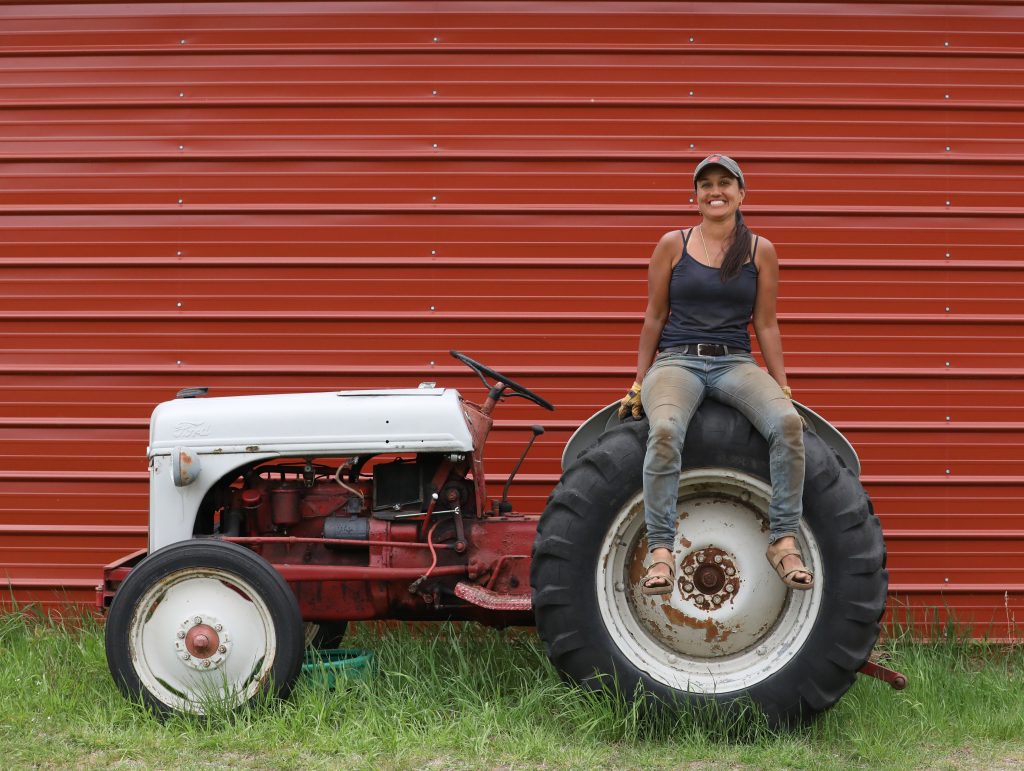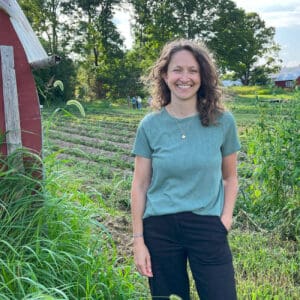We are both grateful and humbled to announce that the New Hampshire Charitable Foundation has awarded a grant to support Land For Good’s work over the next year toward increased farming opportunity for farmers to build and maintain viable businesses, and for farmland to stay in farming.
Thank you to the Charitable Foundation for empowering us to better serve the farming community in New Hampshire!
This award illustrates their ongoing support and dedication to our work. Just this winter we wrapped up a three-year award from the Foundation. The funds from that gift contributed to Land For Good’s financial stability, ensuring a consistent presence in the state and direct support for New Hampshire’s farmers. Financial support from the grant helped us increase our outreach efforts, collaborate with diverse partners, engage in educational events, and broaden our affiliations.
Read more about our New Hampshire partnerships, advocacy work, and the farmland access journey of Andal Sundaramurthy – a beginning farmer whom we helped negotiate and finalize a 10-year lease-to-own agreement on her forever farm in Wilmot.
Partners
Increased funding over the three-year grant period bolstered our collaboration with partners across the state. Specifically we worked with:
- Organization for Refugee and Immigrant Success (ORIS), to support their work with refugee farmers in New Hampshire
- UNH Extension, to deepen succession planning work
- Vital Communities, to support farmland access for beginning farmers
- Cheshire County Conservation District, to provide technical assistance to farmers through the NH Farm Future Fund. This popular program draws in 3-5 farmers per year to provide funding for farm viability planning in concert with the conservation of important agricultural soils
- NH Ag Financiers working group, to partner on a new loan readiness toolkit, a step-by-step guide that helps farmers prepare for applying for a loan
- and other important work with state partners such as NH Food Alliance, NOFA NH, NH Community Loan Fund, Granite State Graziers, and more.
Advocacy
New Hampshire lost roughly 11,600 acres of land to urban development between 2001-2016. It is crucial to protect the state’s prime and important farmland that remains!
In addition to advocating for policy which supports the needs of farmers at the state and federal level, LFG plays an active role in New Hampshire’s Agricultural Land Preservation Support Team. This team supports the agricultural commissioner’s work to update language in HB221, which would make it easier for land trusts to manage conservation easements purchased through the state. The proposed language amendments to this bill will facilitate land trusts’ efforts to keep farmland in farming.
Farmer Spotlight

Copied from the New Hampshire Charitable Foundation’s 2022 Annual Report
A New Hampshire Where Fresh Food Is Abundant
When Andal Sundaramurthy signed the lease on her forever farm in Wilmot, she borrowed her Aunt Cathy’s tractor and drove it down from the family homestead and three miles along Route 4A to get to work.
She borrowed a plow, made ready some land and planted seed potatoes. Last year, she grew some 20 different crops — from asparagus and strawberries to potatoes and carrots.
Andal now has a new Kubota L3301 tractor named Bonnie and a 1948 Ford 8N named Clyde. She is leasing to-own these 15 acres, has acquired and assembled high tunnels for starts and crops, and has established an irrigation system. Her CSA, the first and only one in Wilmot, doubled in size this year.
The nonprofit Land For Good helped Andal negotiate and finalize the 10-year lease on this farm. Land For Good is based in Keene and works across New England. Its mission: “To ensure the future of farming in New England by putting more farmers more securely on more land.” Land For Good helps improve farmers’ access to land and works with farms in transition to continue the legacy to a new generation — as it did recently with the Haynes Dairy in Claremont.
New England produces just 12 percent of the food it consumes, with just 5 percent of land in agricultural production. Some 30 percent of New Hampshire farmers are at or older than retirement age — and many have no farm succession or transfer plan. Recent supply chain disruptions brought on by a global pandemic made clear how vital local food production and supply are to community well-being.
Last year, Andal sold her produce at her roadside stand, at a farmers’ market and through her CSA — and to the New Hampshire Food Bank, through its “New Hampshire Feeding New Hampshire” program.
Andal grew up in New London and attended local public schools. After college, she decided that she wanted to farm in her home state. Her search for land spanned nearly a decade, during which time she learned her trade working on New England farms.
“All these farmers are going out of business and all these people are buying land and not farming it.”
Andal
Now, this small corner of New Hampshire is under cultivation, with a young farmer growing fresh food for the community.
Read the full report: New Hampshire Charitable Foundation 2022 Annual Report
Read the full story on our blog: A farmer’s 10-year journey to finding land to call her own






